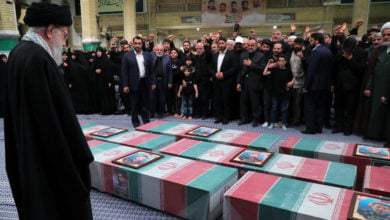This is an edited version of a talk given at the April 25 Chicago Socialism Conference.
It is difficult for people like us to get an honest assessment of what is happening around the world from the mainstream media. It becomes even harder when the focus is the Middle East and nearly impossible if the story is about Iraq.
 |
We are asked to believe that the United States invaded Iraq in 1991 to save Kuwait, and then invaded Iraq again in 2003 to save its people from Saddam Hussein.
The truth about Iraq is quite different. Two years ago, the U.S. military was on the verge of a catastrophic defeat. The Bush administration was thoroughly reviled all around the world, largely due to the extreme barbarity of the invasion and occupation of Iraq.
Since that time, the Pentagon and Washington have launched an all-out effort to hold onto Iraq as a neo-colony. They have organized a massive media campaign to present the occupation as “winding down.” Occupation troops have been withdrawn from fighting in entire regions of the country and Washington has paid out millions of dollars to resistance fighters in an attempt to decrease attacks on U.S. troops.
This strategy started under Bush and has seamlessly continued under Obama, with the same generals and defense department officials. As of now, the same number of U.S. troops are in Iraq—over 144,000—and the Obama administration has no plans to withdraw troops before 2010.
The U.S. goal of dominance over Iraq, Iran and the wider region has not changed in over 70 years. U.S. imperialism has no plans to fully withdraw from Iraq or losing control of its oil. For the oil companies and Wall Street, the Obama administration is seen as a much better spokesperson for their plan to maintain dominance of Iraq.
U.S. imperialism has been directly involved in Iraq since the 1920s, when U.S. oil corporations got 23.75 percent of Iraq’s oil as a reward for entering World War I on the side of the victorious British and French empires. The rest went to the British, the French and the Dutch. Iraq got nothing.
In Iraq, consider the matter of the “Green Zone.” The Green Zone is a 5.6-square-mile community along the west side of the Tigris River in central Baghdad. It is home to roughly 30,000 residents, including 14,000 U.S. and coalition forces. For nearly six years, the Green Zone has been used to paint a picture of stability and U.S. success in Iraq. When U.S. and foreign politicians visit occupied Iraq, they stroll around the Green Zone, being shown beautiful gardens and lavish palaces that paint a picture of a safe and successful occupation. But the Green Zone itself is nothing more than a public-relations prop and a headquarters for the military brass, private military contractors and Western corporations to conduct their affairs in luxury. It is off limits to most Iraqi citizens.
The situation just outside the walls of the Green Zone is drastically different. The Green Zone sits in one of the areas where the Iraqi resistance is strongest and the conditions of occupation are intense. Residents outside its walls must cope daily with the manifestations of the occupation—extreme poverty and violence.
In spite of the realities for most Iraqis, the puppet president, al-Maliki, declared January 1 a national holiday titled “sovereignty day” and claimed the “hand over of security” was a sign of progress. Sovereignty means, “possessing independent national authority.” When tens of thousands of foreign troops are occupying a country it is not possible for that country to be a “sovereign nation.”
The long-term plans of U.S. imperialism to dominate the Middle East flow from the central need of capitalism to control markets and resources. President Obama, as chief administrator of the U.S. capitalist state, must seek to further the interests of the oil companies in the region.
President Bush’s downfall was partly brought on by the Iraqi people’s fierce resistance to U.S. dominance. Though many are hoping for a better outcome under the new president, there is every reason to believe that the Obama administration will ultimately fail to dominate Iraq and the Middle East as well. The people of Iraq and the Middle East will continue to resist imperialist aggression and occupation.
In the spirit of this conference, what we must do is take action. We must stand with the people of Iraq and with the entire Middle East. Every nation has the right to determine its own destiny, as we have the right to determine the destiny of this country—but for that to happen we must take action. That means we must continue to organize and make our voices heard loudly in the streets.






